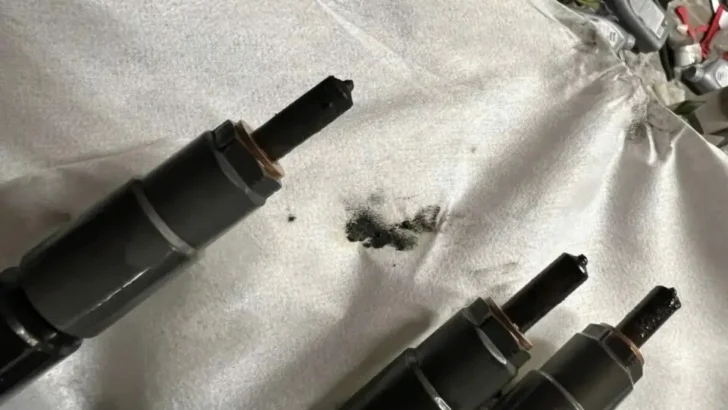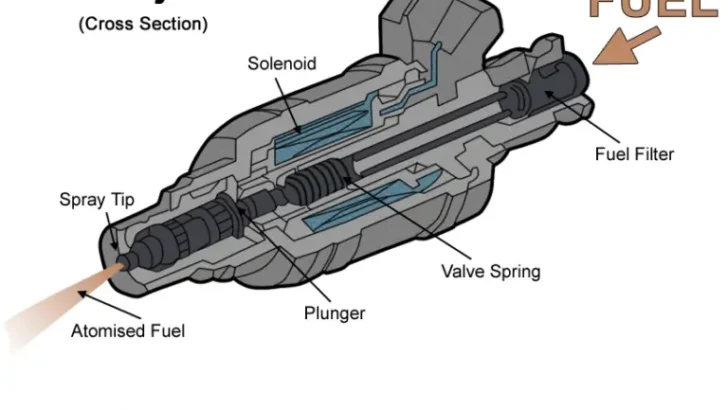If your vehicle is misfiring and you suspect that clogged fuel injectors might be the cause, and you ask yourself will injector cleaner fix the misfire?
A clogged fuel injector will most definitely cause a misfire, but will you be able to clean it with an injector cleaner and make the misfire go away?
Key Takeaway
- Using fuel injector cleaner will help reduce engine misfires caused by clogged fuel injectors, as it can remove deposits and improve fuel flow, but its effectiveness depends on the specific cause of the misfire.
- Dirty injectors can cause a misfire in the engine due to difficulties with the air and fuel mixture.
- The time it takes for fuel injector cleaner to work can vary, but typically results can be seen within 500-1000 miles of usage.
Can Dirty Injectors Cause a Misfire?

Yes, dirty fuel injectors can lead to an engine misfire because they disrupt the correct balance of fuel and air in the engine.
Fuel injectors are a crucial part of the engine’s fuel system, responsible for delivering fuel into the engine in a precise, controlled manner.
When the injectors are dirty or clogged, they cannot deliver the right amount of fuel.
This imbalance in the air-fuel mixture can cause the engine to misfire, as it doesn’t have the right conditions for proper combustion.
Misfires can lead to a range of issues, including reduced engine performance, increased emissions, and potential damage to the engine over time.
Thus, maintaining clean fuel injectors is essential for the smooth and efficient operation of the engine.
Will Injector Cleaner Fix a Misfire?

Yes. A fuel injector cleaner can fix a misfire caused by an unbalanced air-to-fuel ratio that results from clogged fuel injectors.
Using fuel injector cleaner may help reduce engine misfires caused by clogged fuel injectors, as it can remove deposits and improve fuel flow.
However, it may not be potent enough to dissolve stubborn deposits or resolve misfires in all cases, especially if the issue is due to other factors.
It is important to diagnose the root cause of the misfire and consider professional assistance if needed.
How Long Does It Take For Fuel Injector Cleaner To Work?
It takes about one to two full tanks of fuel, or around 500 to 1,000 miles for the fuel injector cleaner to work.
In general, it is recommended to run a full tank of treated fuel through the system to allow the cleaner to dissolve and remove deposits.
However, some fuel injector cleaners claim to deliver noticeable improvements in performance within just a few hundred miles.
It’s important to follow the instructions provided by the specific cleaner you are using for the best results.
How To Check If The Fuel Injector Is Causing a Misfire?
To check if a fuel injector is causing a misfire, you can perform the following steps:
- Use a diagnostic scan tool: Connect a diagnostic scan tool to your vehicle’s onboard computer system and check for any trouble codes related to fuel injectors or misfires. These codes can indicate if a specific fuel injector is causing the issue.
- Check for misfire symptoms: Look for common signs of a misfire such as rough idle, sputtering engine, decreased power or acceleration, difficulty starting, or increased exhaust emissions. These symptoms can point towards a faulty fuel injector.
- Perform a cylinder balance test: This test involves temporarily disabling each fuel injector one by one while the engine is running. If the misfire symptoms decrease or disappear when a specific fuel injector is disabled, it indicates that a particular injector may be causing the misfire.
- Inspect fuel injector connections: Ensure that the electrical connections to the fuel injectors are secure and free of corrosion or damage. Loose or faulty connections can lead to misfires.
- Use a fuel pressure gauge: Measure the fuel pressure in the fuel rail using a fuel pressure gauge. Low fuel pressure can result in inadequate fuel delivery to the injectors, leading to misfires.
- Conduct a fuel injector flow test: This test involves removing the fuel injectors from the engine and connecting them to a specialized testing apparatus. The flow test measures the amount of fuel each injector delivers over a specified period. Significant variations in flow rates between injectors can indicate a clogged or faulty injector.
How To Clean Fuel Injectors and Fix Engine Misfire
Here is how to clean your fuel injectors and fix a misfire:
1. Get your tank to nearly empty
Your gas tank needs to be nearly empty before you add the fuel injector cleaner into the gas tank. So, plan you fuel and make sure you are at the gas station right before your fuel reserve light comes on.
2. Add the fuel injector cleaner
Once your gas tank is nearly empty, go to the gas station and add the fuel injector cleaner. The fuel injector cleaner that I use costs around $30 and you can [amazon fields=”B00B1VBQRS” value=”thumb”]. I use one full can for a full gas tank.
The manufacturer of the fuel injector cleaner recommends that you do this each time you change your engine oil.
3. Fill up your fuel tank
Once you add the fuel injector cleaner into the gas tank, fill the gas tank to the top. The fuel injector cleaner will be mixed with the fuel and will go into the fuel system and then into the engine along with the fuel.
4. Spend all of the fuel
You will have to spend the full fuel tank in the next couple of days. Make sure to go out on a highway or somewhere where you can drive at least 60 miles per hour. I like to drive 60 miles per hour constantly for an hour or two. It helps the fuel injector cleaner to do its job more efficiently.
5. Clean fuel injectors and no more misfire
At this point, you should have clean fuel injectors and no more misfires. Also, the fuel injector cleaner will clean all the carbon build-up on the cylinders and will increase the overall engine performance.
How Fuel Injectors Work

In order for an engine to function efficiently, it needs a perfect mix of air and fuel. Fuel injectors are in charge of delivering this mixture to the cylinder where an explosion happens that produces power.
The ideal fuel-to-air ratio is 14.7 to 1. That means for every unit of fuel, 14.7 units of air is needed to achieve the perfect combustion. This ratio is referred to as a perfectly balanced stoichiometric air-to-fuel ratio.
Before fuel injectors were invented, cars used to have carburetors. But the fuel injectors offer more benefits like easier cold starts, better fuel efficiency, and more consistent transient throttle response.
The fuel injectors also make sure that an equivalent amount of fuel is distributed consistently across all cylinders. This prevents inconsistent fuel distribution and therefore inconsistent power delivery.
The fuel injection is fed by the fuel rail which is located on top of the cylinder bay. Thanks to the pressure from the fuel pump, the fuel gets forced into the injector from the fuel rail and goes through a small filter inside the injector. Once the gas is inside the injector, it hangs out as a reserve and waits for the right moment to spray.
Then, when the moment comes, an electromagnetic coil pulls the plunger up and opens the pintle injector and fuel is sprayed out of the nozzle.
The sprays are very fast and can occur multiple times each second, and every spray releases the exact amount of fuel. The timing is controlled by the ECU and it works together with the spark plugs that ignite the air and fuel mixture.
Signs of a Clogged Fuel Injector
- Rough idle or engine misfires.
- Decreased fuel efficiency.
- Loss of power or acceleration.
- Difficulty starting the engine.
- Stalling or hesitation while driving.
- Increased exhaust emissions.
- Poor engine performance.
- Fuel smell from the exhaust.
- Engine knocking or pinging sounds.
FAQs
Q: Will using a fuel injector cleaner fix a misfire?
A: Using a fuel injector cleaner can sometimes fix a misfire. If the cause of the misfire is a clogged fuel injector, the cleaner can help remove the clog and restore proper fuel flow.
Q: Can a clogged fuel injector cause a misfire?
A: Yes, a clogged fuel injector can cause a misfire. When the fuel injector is clogged, it may not be able to deliver the proper amount of fuel to the engine, resulting in a misfire.
Q: How does a fuel injector cleaner work?
A: Fuel injector cleaners work by using special additives that help dissolve and remove deposits, such as carbon, from the fuel injectors. This can help improve fuel flow and restore proper function.
Q: Is it safe to use a fuel injector cleaner?
A: Yes, using a fuel injector cleaner is generally safe. However, it is important to follow the instructions provided by the manufacturer and use the cleaner as directed.
Q: Can fuel injector cleaner cause problems?
A: In some cases, using a fuel injector cleaner may cause temporary issues such as rough idle or poor fuel economy. This is usually a result of loosening deposits in the fuel system. However, these issues should resolve once the cleaner has done its job.
Q: Can a fuel injector cleaner fix a spark plug misfire?
A: No, a fuel injector cleaner will not fix a misfire caused by a faulty spark plug. In this case, it is necessary to replace the spark plug to resolve the misfire.
Q: How often should I use a fuel injector cleaner?
A: The frequency of using a fuel injector cleaner depends on the specific product. Generally, it is recommended to use it every 3,000 to 5,000 miles or as specified by the manufacturer.
Q: Can a fuel injector cleaner fix a clogged fuel filter?
A: No, a fuel injector cleaner is designed to clean the fuel injectors, not the fuel filter. If the fuel filter is clogged, it is necessary to replace it to restore proper fuel flow.
Q: Can a fuel injector cleaner fix a misfire caused by a bad fuel pump?
A: No, a fuel injector cleaner will not fix a misfire caused by a bad fuel pump. If the fuel pump is faulty, it needs to be replaced to resolve the misfire.
Q: What is the best fuel injector cleaner?
A: There are many good fuel injector cleaners available on the market. Some popular options include Chevron Techron Concentrate Plus, Sea Foam, and Lucas Fuel Injector Cleaner. It is recommended to choose a reputable brand and follow the instructions provided.
In Conclusion
In summary, injector cleaners are an effective solution for resolving misfire issues. It is important to use the right type of cleaner and follow instructions carefully to ensure proper usage.
Regular use of injector cleaner helps keep the fuel system running efficiently and can help prevent costly repairs in the future.
